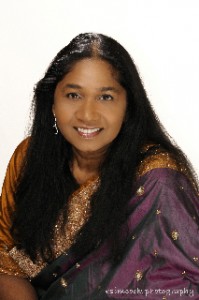Born in a Sri Lankan Tamil family in Malaysia, educated in Singapore and later immigrated to the UK, Rani Moorthy, the versatile writer, actor and presenter, thinks that she has always been an outsider, and this makes her see the world in a little different way. Speaking to Anjana Parikh from Asian Lite, Ms Moorthy talks about ‘If Only Shah Rukh Khan…? — a play with a difference that showcases how cultural differences add interesting details but ultimately, her plays are there to open a window into a communal room.
• What inspired you to write ‘If Only Shah Rukh Khan….?
I wanted to interpret the concept of the “auntiji” usually the unmarried Asian woman who without husband and children hasn’t got the usual things to root her into the community and often is a figure of fun or a mystery. These women have complex inner lives and a past that is full of hope and promise but now live with their memories and transfer their fantasies onto icons like SRK.

• Is it difficult to carry on with the one-woman show title?
This is my ninth show and five have not been one woman shows so I do write according to what characters I need to tell a strong story. In this work the young Kenyan boy came into my consciousness so how the play merges is still a mystery.
• What are the tricks and tools of your trade?
A great imagination, a good computer and keep the fridge locked, throw away the key.
• Why did you choose to do theatre?
I’m a big woman with a big voice and something significant to say, I was on stage at 3 singing something funny and everyone laughed and that shared experience has not left me.
• Did you have the vision to do things differently?
I grew up Sri Lankan Tamil in a small community in Malaysia, the educated in Singapore. So I was always an outsider and that makes you see the world a little differently. Giving voice to the marginalised and voiceless people.
• How often do you write? Does writing come to you naturally?
Writing does not come naturally but the need to tell a story is so strong and the idea that something will not exist until I write.
• How did you get involved in theatre and what made you stay?
School, and I was good at it.
• Do you ever feel like going back to Sri Lanka?
Yes, I took a play of mine to Sri Lanka in 2003 through the British Council and toured the war zone as well as the rest of the beautiful country.
• Is drama useful for effecting political change?
In the best way which is through telling strong, truthful stories with complex characters who speak from the heart. Change can only happen from within.
• From where do you get story ideas?
Observation, I’m drawn to finding things that we share as human beings which is why I think I always will have a very diverse audience. Cultural differences add interesting details but ultimately my plays are there to open a little window into a communal room.
• What inspires you?
People, acts of honour and kindness, misunderstood characters, big stories that transcend culture and time. Anything that bucks the trend, the worst thing is to write in order to be popular or trendy. I aim to write timeless work, whether I achieve of not is another question but that is my aim.
• Do you make enough from your art to live on?
Only SRK does, I think and so he should.
• How important is it to preserve one’s culture and language especially for those living in the UK?
As long as it comes from the need to find your own journey towards identity and, not imposed from outside.
• You did a show called ‘Hymns of the Drowning’. What is it about?
I worked with the Tamil community in Manchester to find stories of survival from the civil war in Sri Lanka. I played all the characters in order to conceal their identity. But they generosity let me use their stories.
• You are an actor, writer and TV/ radio presenter. What keeps you motivated?
A desire to communicate, use my voice hopefully for a cause bigger than myself.
• What impact did the civil war in Sri Lanka have on Tamil diasporas?
More than we can even begin to comprehend. It’s how I feel about any ethnic conflict or any evidence of man’s inhumanity to man, Palestine, Syria, Bosnia, Burma, the list goes on. That is why I keep writing. I am a custodian of my ancestors’ hopes and dreams and all the young people killed who don’t have a voice. Tears as I write this.
• What is your experience of Asians at the theatre?
They know what they like but really need to have a sense of adventure about theatre. Be open to thought provoking and challenging stories. Art has the power to heal and don’t always move to escapism. If Only Shahrukh Khan examines why we need Bollywood which feeds our joy and love of the subcontinent but it also shows how an awareness of a life half lived can bring great liberation.
• How would you like people to recognise your work?
I would like people to be moved, to remember, to have something stay with them, give them hope or affect any kind of change to raise awareness. And always have a belly laugh.